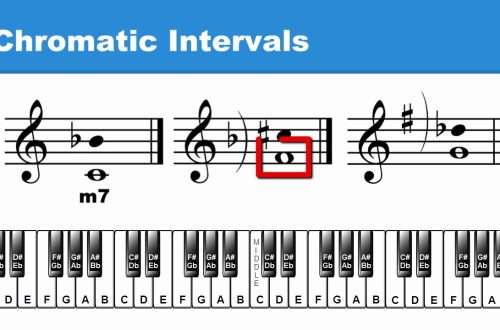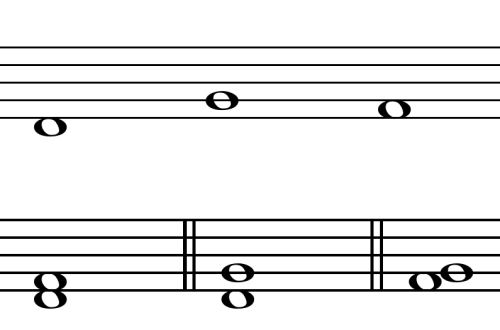
Music calendar – September
In the music world, the first month of autumn is a kind of transition from rest to the resumption of concert activity, the expectation of new premieres. The breath of summer is still felt, but the musicians are already planning things for the new season.
September was marked by the birth of several gifted musicians at once. These are composers D. Shostakovich, A. Dvorak, J. Frescobaldi, M. Oginsky, conductor Yevgeny Svetlanov, violinist David Oistrakh.
Creators of enchanting melodies
3 September 1803 years in Moscow, in the house of a church composer, serf musician was born Alexander Gurilev. He entered the history of music as the author of delightful lyrical romances. The boy showed his talent early. From the age of 6, he studied the piano under the guidance of I. Genishta and D. Field, played the viola and violin in the orchestra of Count Orlov, and a little later became a member of the quartet of Prince Golitsyn.
After receiving a freestyle, Gurilev began to actively engage in concert and composing activities. His romances very quickly gained popularity among the urban population, and many “went to the people.” Among the most beloved ones, one can name “Both Boring and Sad”, “Mother Dove”, “The Swallow Curls”, etc.
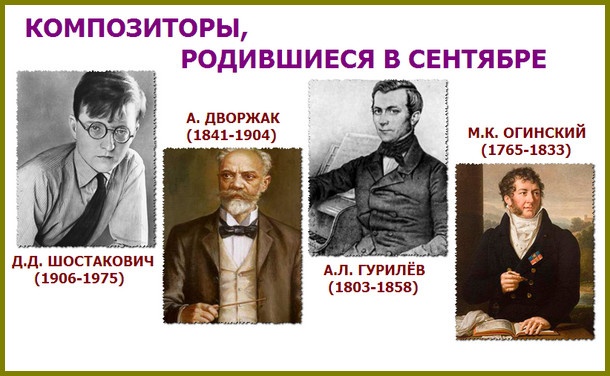
8 September 1841 years the 2nd Czech classic after Smetana came to the world Antonin Dvorak. Born into a butcher’s family, he put a lot of effort into becoming a musician, contrary to family tradition. After graduating from the Organ School in Prague, the composer was able to get a job as a violist in the Czech National Orchestra, and then as an organist in the Prague Church of St. Adalbert. This position allowed him to come to grips with composing activities. Among his works, the most famous were “Slavic Dances”, the opera “Jacobin”, the 9th symphony “From the New World”.
13 September 1583 years in the city of Ferrara, considered in the XNUMXth century one of the centers of musical culture, was born an outstanding master of the Baroque era, the founder of the Italian organ school Girolamo Frescobaldi. He worked as a harpsichordist and organist in various churches, at the courts of noblemen. Frescobaldi’s fame was brought by 1603 canzones published in 3 and the First Book of Madrigals. At the same time, the composer took a very high post as organist of St. Peter’s Cathedral in Rome, where he served until his death. Such masters as I.S. Bach and D. Buxtehude.
25 September 1765 years in the town of Guzow near Warsaw was born Mikhail Kleofas Oginsky, who later became not only a famous composer, but also an outstanding political figure. His life was surrounded by an aura of romance and mystery, even during his lifetime there were legends about him, he heard several times about his alleged death.
The composer was born into a high-ranking family. His uncle, the great Lithuanian hetman Mikhail Kazimierz Ogiński, was an enthusiastic musician, composing operas and instrumental works. Oginsky received his initial skills in playing the piano from the court musician of the Osip Kozlovsky family, then he improved his skills in Italy. Actively engaged in political activities, the composer joined the Kosciuszko uprising in 1794, and after his defeat was forced to leave his homeland. Among his works that have survived to this day, the polonaise “Farewell to the Motherland” is very popular.
M. Oginsky – Polonaise “Farewell to the Motherland”
25 September 1906 years an outstanding composer-symphonist, a classic of the XNUMXth century came into the world Dmitry Shostakovich. He declared himself in most genres, but gave preference to the symphony. Living in a difficult time for Russia and the USSR, he was not only praised by the authorities and critics, but was condemned more than once. But in his work, he always remained true to his principles, therefore he gravitated towards the symphony as a genre freer for expressing thoughts.
He created 15 symphonies. One of the most significant was the 7th “Leningrad” symphony, which expressed the desire of the entire Soviet people to defeat fascism. Another work in which the composer embodied the most acute conflicts of our time was the opera Katerina Izmailova.
Maestro of sounds
6 September 1928 years the greatest conductor of our time was born in Moscow Evgeny Svetlanov. In addition to conducting, he is known as a public figure, theorist, pianist, author of numerous essays, essays, and articles. For most of his life he served as chief conductor and head of the USSR State Symphony Orchestra.
Svetlanov had a special flair that allowed him to create integral monumental forms, while at the same time carefully polishing the details. The basis of his creative style is the maximum melodiousness of the orchestra. The conductor was an active propagandist of Russian and Soviet music. Over the years, he has been awarded numerous awards and honorary titles. The main achievement of the maestro was the creation of the “Anthology of Russian Symphonic Music”
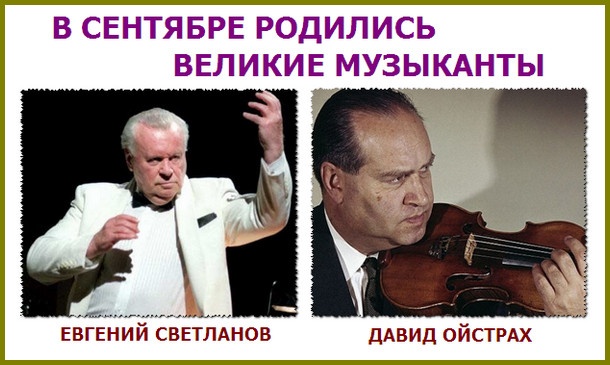

13 September 1908 years a violinist was born in Odessa David Oistrakh. Musicologists associate the flourishing of the domestic violin school with his name. His playing was characterized by extraordinary lightness of technique, perfect purity of intonation and deep disclosure of images. Although Oistrakh’s repertoire included famous violin works by foreign classics, he was a tireless propagandist of Soviet masters of the violin genre. He became the first performer of works for violin by A. Khachaturian, N. Rakov, N. Myaskovsky.
Events that left a mark on musical history
With a difference of 6 years, 2 events took place in September that turned music education in Russia upside down. On September 20, 1862, with the direct participation of Anton Rubinstein, the grand opening of the first Russian conservatory in St. Petersburg took place. N.A. worked there for a long time. Rimsky-Korsakov. And on September 13, 1866, the Moscow Conservatory was opened under the direction of Nikolai Rubinstein, where P.I. Chaikovsky.
On September 30, 1791, the last opera of the great Mozart, The Magic Flute, was presented to the audience at the An der Wien Theater in Vienna. The orchestra was directed by the maestro himself. Although there is no exact information about the success of the first productions, it is known that the music fell in love with the audience, melodies from the opera were constantly heard on the streets and in the houses of Vienna.
D.D. Shostakovich – Romance from the film “The Gadfly”
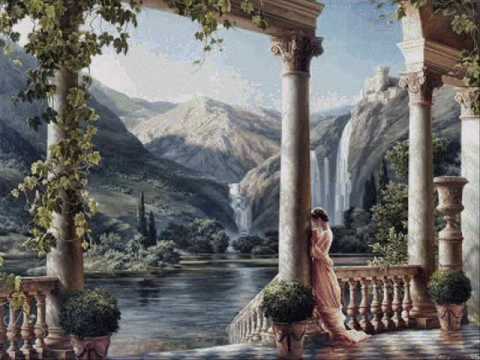

Watch this video on YouTube
Author – Victoria Denisova



